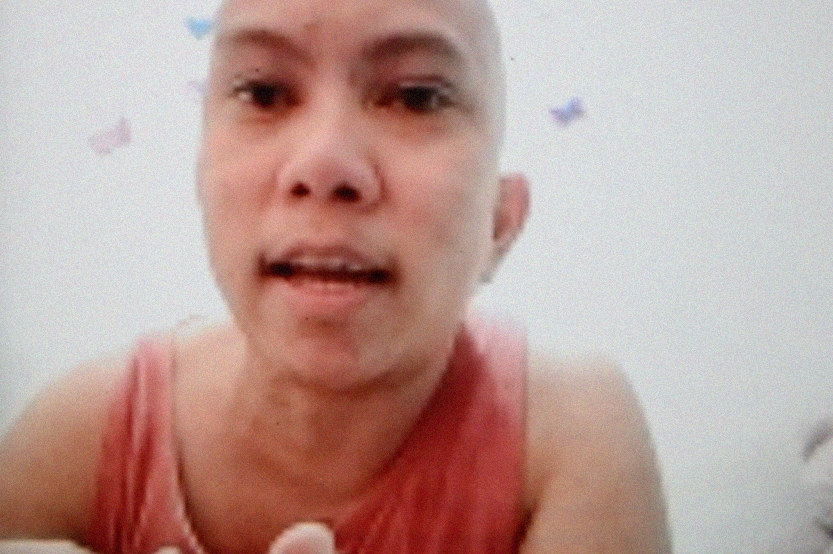At the moment, LGBTQIA people are (often) excluded in government assistance related to Covid-19, said Magdalena Robinson, CEO of the Cebu United Rainbow LGBTIQ+ Sector Inc. There are various (and many of them interrelated) reasons why this is so – e.g. because marriage equality is not recognized in the Philippines, many LGBTQIA Filipinos live alone (“For example, they just rent rooms”) or perhaps couples live together yet are just considered as board mates, so they are not considered to belong to “homes”/”households”. “That’s a difficulty (that affects) access to the assistance of the government.”
It is the intersection/inter-connection of issues that – in truth – define the experience of transgender Filipinos in particular as they try to survive the Covid-19 lockdown.
WANTED: ACCESS TO MEDS
To start, there’s the issue with accessing hormonal medications.
As noted by Jhen Latorre of the Pioneer FTM (Pioneer Filipino Trans men Movement), members of the transpinoy/trans men community already noted issues re accessing testosterone (hormonal medications). Not only because the stocks are limited, ordering is challenging, but also “mahirap ang shipping (we also encounter issues with shipping).” This is even more so for those in provinces.
Robinson added that many trans people access hormonal medications from the black market. For example, some local suppliers buy from Thailand. But there are now issues with stocks, affected by the lockdown that limits mobility of goods (from overseas, as well as locally).
Now, this is worth highlighting: According to Kate Montecarlo Cordova, founding chairperson of the Association of Transgender People in the Philippines, “people have a hard time understanding the health impact of hormones to trans people.”
Cordova said that many people now “think that taking hormones is just a luxury; that we just want it, and it’s not even needed.”
She added that often neglected in this line of conversation are the biological/physical, economic/financial, and psychological/emotional impacts of not having these hormonal medications – e.g. there are trans women who work as entertainers, and not having access to the needed meds could affect their physicality, which could affect their means of living.
In the end, “these are all interrelated,” Cordova said. “There are intersectionalities.”
‘FORCED INVISIBILITY’
Obviously this touches on the continuing “forced invisibility” of trans people in the Philippines particularly when talking legally – e.g. the country still doesn’t have gender recognition law, and basically misgenders trans people by legally pigeonholing them according to their assigned sex at birth.

INFORMAL WORKERS
According to Latorre, at least in his group, most of their members have jobs that: 1. allow them to work at home, and 2. still give them regular salaries even during the Covid-19 lockdown.
But there are also those who are affected by “no work, no pay,” he said. So these people now only rely from the support of family members.”
Shane R. Parreno, chairperson of the Transpinays of Antipolo Organization, said that the percentage of members of the trans community who hold regular jobs remains low.
Local figures continue to be limited on this, but at least in the US, 29% of trans people live in poverty, compared to 14% of the general population; and trans people experience unemployment at three times the rate of the general population, with 30% of trans people reporting being fired, denied a promotion, or experiencing mistreatment in the workplace due to their gender identity in the past 12 months.
For Parreno, may trans Filipinos – and LGBTQIA community members, for that matter – are informal workers, e.g. hairdressers, make-up artists/cosmetologists, and tailors/seamstresses. And with “everybody affected by the lockdown, those working in these fields/areas do not have clients, so they do not earn,” she said.
Robinson stressed the same point: There are trans women who work in the beauty industry, fashion industry, et cetera who do not have income now. “So we hope they will not be left out (in the giving of needed support from the government during the pandemic).”
Latorre – who has two kids, but who also did not qualify in the government’s definition of “household” to be given support – said that even before, LGBTQIA families have always been set aside.
And because “there are trans people who are the breadwinners,” Parreno said, “I hope that their SOGIESC won’t be reason for them not to be included in (government support).”

ACCESS TO MEDICAL CARE
There’s also the difficulty in getting medical care.
Recognizing that trans people may need to see medical professionals (e.g. when transitioning), Latorre also isn’t aware of clinics that are now open for them to access. This issue is ongoing, however, and is apparent even when there’s no lockdown, since there remain few – if any – trans-specific medical practitioners in the Philippines, perhaps even more particularly in provinces.
“Sana di na magtagal ito ng sobra (I hope the lockdown doesn’t last long),” Latorre said, because “alam ko din naman na kailangan pa din to see a doctor lalo na sa too-serious na matters (I recognize that there is still need to see a doctor, particularly for very serious matters).”

HELPING EACH OTHER
For Latorre, “nakakatulong ang organization (trans organizations help).” For instance, members of trans organizations can give tips re transitioning, or – if meds are needed – they can “lend” supplies.
In Cebu in central Philippines, Robinson said that transpinays asked their networks on where to get supplies. And when supplies are really hard to get, “we just advise them on the alternatives – e.g. maybe there are fruits that have high estrogen or anti-androgen properties.”
Some food that are estrogen-rich, and help lower testosterone levels include: soy products like edamame, tofu, soy milk and miso; spearmint and peppermint; licorice root; vegetable oils; flaxseed; and certain types of nuts.
“We give out this information so we have alternatives for them,” said Robinson, adding that those who received the information are “advised to share the same to their contacts.”
For Robinson, “everyone is experiencing difficulties,” she said, so “we have to support each other, fix each other’s crown.”
Latorre also has a practical recommendation: Since trans people are at home during the lockdown, they may want to use this to find time to talk to their families. “Baka ito na ang oras to open up (Maybe this is a good time to open up),” he said.
Cordova said that the lockdown highlights that “it’s about time that we comfort each other. We can’t expect our government, or other people to comfort us.”

Meanwhile, Parreno has practical recommendations.
“Let’s support our government – e.g. when it says for us to stay home, stay home. Talagang malaki ang impact nito (This has a big impact),” she said. “Ipakita natin… na hindi tayo pasaway (Let’s show others we’re not troublesome).”
And in the end, “let’s pray that this will end soon para magkita-kita na tayo ulit, maka-rampa na tayo ulit (so we can see each other again, and wander/jaunt again).”





























































